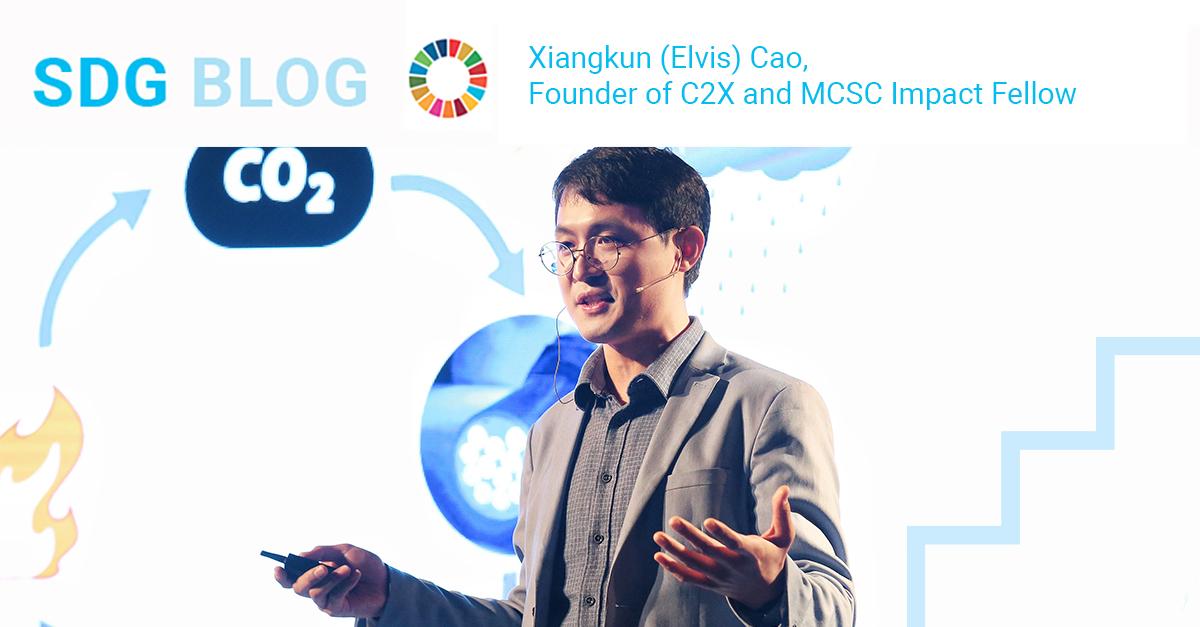SDG Blog

Impacting climate as a young innovator
By Xiangkun (Elvis) Cao, Founder of C2X and MIT Climate & Sustainability Consortium Impact Fellow
From a kid in a small village in China to Forbes 30 under 30
Born and growing up in a remote countryside in China in the early 90’s, I have witnessed first-hand the environmental burden of unregulated swine wastewater pouring into the rivers in my village. Later, I learned from a middle school chemistry class that human civilization faces another environmental challenge, even greater than pollution: global climate change, and that scientists have been tirelessly exploring technological solutions. That idea was the spark – I went on to receive five academic degrees, including two Bachelor’s, two Master’s, and a Ph.D. degree in China, Canada, and the United States, even though neither of my parents ever graduated from high school. All this with a single focus in my mind – helping the world fight the climate crisis. During my Ph.D. study at Cornell University, I landed on the Forbes 30 under 30 in Energy for North America for a reactor project to convert carbon dioxide, the waste product from industrial facilities that is largely responsible for global warming, into sustainable fuels and feedstocks.
Reimagining our carbon liability as an opportunity
Trained as an engineer through my past education, I gradually developed the notion that, with the way our system is constructed, unless someone stands to use technological solutions to make money from waste CO2 emissions, it’s challenging to get anyone to do anything about climate change. Throughout my Ph.D. at Cornell, I had the opportunity to witness the reactor project I worked on scaled up from a proof-of-concept prototype in our lab at Ithaca, NY, to real-world deployment in the $20M Carbon XPRIZE finals at Gillette, WY. By upscaling carbon capture, utilization, and storage (CCUS) technologies, there’s potential to create a profitable business while mitigating global climate change.
The nexus of technology, business, and policy
Having realized a vital issue with the conversation around climate is that there is little mention of the economic benefits, I founded the C2X initiative, aiming to change the narrative surrounding large-scale sustainability operations and to redefine CO2 as a resource, not a liability. With this initiative, I engaged various stakeholders in the climate sector and empowered the youth and the public to talk about CCUS and climate actions.
As Phil De Luna and I recently wrote in Matter, “policy helps spur markets, business is the engine for action, and technology is the catalyst for change.” I believe innovation happens at the nexus of technology, business, and policy. Earlier this year, I participated in the UN DESA Global Policy Dialogues for Climate Action, and served as a UN Technical Working Group Member on Energy Transition to co-develop an action-oriented global roadmap on global energy sector decarbonization strategies. These experiences also enabled me to see public engagement as an efficient way to inform policymaking. Recently, I also engaged business leaders on CCUS and sustainability. Because of my effort in C2X, I was selected into the World Energy Council’s Future Energy Leaders Programme (FEL-100), which is “designed to help shape, inspire and grow energy leaders of tomorrow.”
Maximizing the impact of youth actions by meaningful partnership
As a young person working to impact climate, I recall various moments of self-doubt and despair at the rate of climate change. In those difficult times, I found building meaningful partnerships with external organizations helped me overcome these challenges and forge ahead to make an impact in the climate sector. C2X recently joined the Young Changemaker on Sustainable WASH Solutions Programme to receive mentorship from the UN Children’s Fund (UNICEF) and the Young Champions of the Earth Competition Programme to receive support from the UN Environment Programme (UNEP). We also received funding and mentorship from the Commission for Environmental Cooperation (CEC) through their Youth Innovation Challenge. Personally, I also joined the MIT Climate & Sustainability Consortium (MCSC) as its Impact Fellow, with the mission to transcend academia and industry to enable near-term change for a more sustainable future, at the intersection of MIT Climate and Sustainability Consortium and member companies.
The clock is ticking for urgent climate actions
I was born when atmospheric CO2 concentration was at 355 parts per million (ppm). Today, it has reached over 413 ppm and is showing no signs of stopping. While “the Greta effect” has shown youth actions can make a great impact, even more meaningful climate actions of youth, by youth, for youth are needed more than ever. After all, it will be us, young people, who will have to live with the consequences of global climate change for the rest of our lives. The clock is ticking, and youth needs to act now.
* The views expressed in this blog are the author’s and do not necessarily reflect the opinion of UN DESA.
 Welcome to the United Nations
Welcome to the United Nations